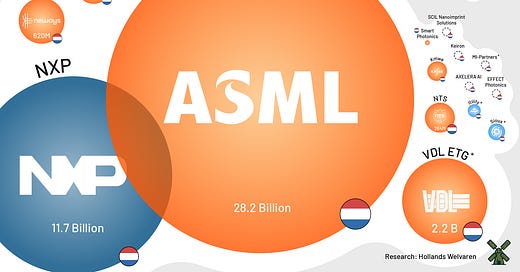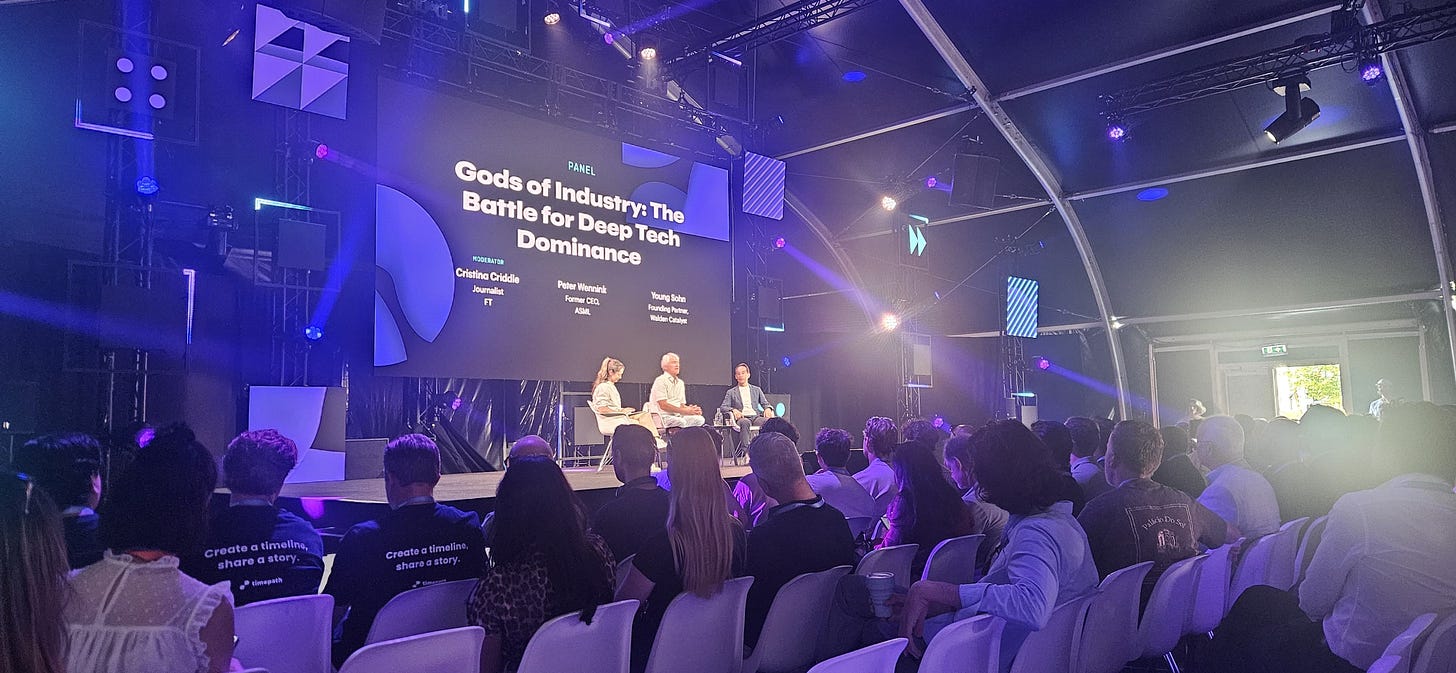'Trump could be the best thing that ever happened to Europe'
Welcome to your lowkey, easy-to-follow newsletter about the fundament of (almost) everything. Here's Aafke's Saturday CHIPS!
The Netherlands has Europe's leading chip industry - but how big is it? That question, Joris Heijn —the mastermind behind the newsletter Hollands Welvaren —asked himself.
Due to the sector's fragmentation, no figures are available on the Dutch chip industry. At least, that what the Dutch Central Bureau of Statistics, told Joris. So he scoured through dozens of annual reports. He summarized the results of his research in the infographic below. Want to know more? You can read the newsletter ‘Hollands Welvaren’ here.
How do I survive when the big brother pulls out?
Former top executive of the far biggest circle, Peter Wennink, chimed in yesterday for a panel on the geopolitical battle for deep-tech dominance. He and Young Sohn (former Samsung top executive, investor, and founder) were announced as “Gods of Industry” at TNW in Amsterdam last week, one of Europe's most influential tech events.
The conversation, after a biology lesson, quickly took a geopolitical turn. “Every government is now necessarily asking itself: how do I survive if the big brother [the United States, ed.] pulls out?” I heard Sohn wonder.
The officially retired Wennink notices a growing sense of urgency among companies, organizations, and governments. "We can no longer afford to think only of ourselves. This unpredictability is forcing a rethink. Trump called the Netherlands ‘fat, dumb and happy’ several years ago. Those days are now over - Trump may well be the best thing that has happened to Europe. It has awakened people and governments."
According to Wennink, this is visible at Dutch pension funds, among others. "There is over €1,500 billion there, more than 60% of which is invested outside the Netherlands and Europe. Those funds are now being questioned: why doesn't that money flow back into their ecosystem?" A positive development, according to the former ASML executive.
Structural underinvestment in technology
Dijsselboem, the mayor of Eindhoven, is a bit more pessimistic. According to him, the uncertainty surrounding nitrogen, power capacity, housing, talent, and financing poses a direct threat to ASML's planned expansion. "If we cannot provide clarity on these issues in the coming months, there is a real risk that ASML will move elsewhere. And that would be disastrous, not only for Brainport, but for the strategic position of the Netherlands and Europe in the global technology sector."]
The mayor is particularly concerned about the structural underinvestment in technology. "In South Korea, 17 billion is being invested over four years. In the Netherlands, on the other hand, cuts are being made in R&D." Since 2019, the R&D budget in OECD countries has increased by 17%. In the Netherlands, the number has decreased by 4%."
At the same time, a national record for funding in quantum computing was set. Dutch startup Orange QS raised €12 million. PhotonDelta, the Dutch Ministry of Economic Affairs and Defense, and TNO will jointly fund a €153 million investment in a photonic chip pilot plant. So things are changing - but will it come soon enough?
Dijsselbloem: months to come are decisive for high-tech industry
Dutch record: Quantum computing startup Orange QS raises €12 mln
Construction of €153 mln photonic chip pilot plant starts in 2025
And here’s more news on chips:
Breakthroughs in electronics, photonics and circularity for Holst
Netherlands and Singapore strengthen semiconductor cooperation
Brain-inspired chips moving out of the lab and into your business
Enjoy the sun!
Aafke Eppinga,
editor-in-chief at Innovation Origins






